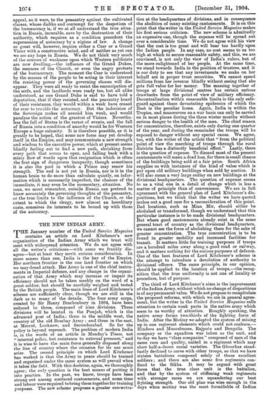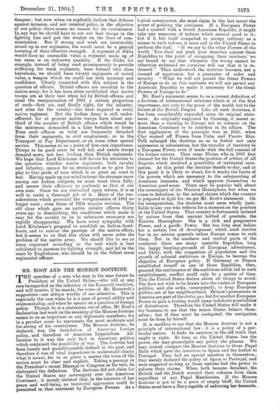T HE January number of the United Service Magazine contains an
article on Lord Kitchener's new organisation of the Indian Army which we trust will meet with widespread attention. We do not agree with all the writer's criticisms—with some we frankly dis- agree—but at least they merit serious consideration. In more senses than one, India is the key of the Empire. Her northern frontier is the one land frontier on which we may dread attack. Her Army is one of the chief instru- ments in Imperial defence, and any change in the organi- sation of that Army which may increase or impair its efficiency should not be taken meekly on the word of a great soldier, but should be carefully weighed and tested by the British people. The main lines of Lord Kitchener's scheme are sufficiently clear, though we are still in the dark as to many of the details. The four army corps, created by Sir Henry Brackenbury in 1894, have been reduced to three, composed of nine divisions. Three divisions will be located in the Punjab, which is the advanced post of India; three in the middle west, the country of the old Bombay Army ; and three in the east, at Meerut, Luck-now, and Secunderabad. So far the policy is beyond reproach. The problem of modem India is, in the words of an article in Monday's Times, not "internal police, but resistance to external pressure," and it is wise to have the main force generally disposed along the line of country where the occasion for its use must arise. The second principle on which Lord Kitchener has worked is that the Army in peace should be trained and organised under the same system as will prevail when it takes the field. With this doctrine, again, we thoroughly agree ; the only question is the best means of putting it into practice. In the past, we know, troops have been ' strung out among scattered cantonments, and some time and labour were required to bring them together for training purposes. The new scheme proposes a greater concentra- tion at the headquarters of divisions, and in consequence the abolition of many existing cantonments. It is on this point that the writer in the United Service Magazine makes his first serious criticism. The new scheme is admittedly an expensive one, though the expense will be spread out over a considerable time. We do not agree with his view that the cost is too great and will bear too hardly upon the Indian people. In any case, no cost seems to us too high at which to secure reasonable safety, and this, we are convinced, is not only the view of India's rulers, but of the more enlightened of her people. At the same time, we stand towards India in the position of trustees, and it is our duty to see that any investments we make on her behalf are in proper trust securities. We cannot spend millions from her revenue blindly without seeing that she gets full value for her money. The massing together of troops at large divisional centres has certain serious drawbacks from the point of view of military efficiency. Decentralisation within reasonable limits is the only safe- guard against those devastating epidemics of which the East is the peculiar home. Again, India is within the Tropics, and manceuvres on a war basis can only be carried. on in most places during the three winter months without serious danger to the health of the men. The chief reason for concentration, therefore, exists only during one quarter of the year, and during the remainder the troops will be exposed to danger without any special cause. We agree, too, with the writer of the article that "from the political point of view the marching of troops through the rural districts has a distinctly beneficial effect." Lastly, there is the question of expense. To discard most of the present cantonments will mean a dead loss, for there is small chance of the buildings being sold at a fair price. South Africa supplies us with instances of the kind of value which is put upon old military buildings when sold by auction. It will also mean a very large outlay on new buildings at the divisional headquarters. The question of expense seems to us a vital one in a detail of change which is less a matter of principle than of convenience. We are in full agreement with the general plan of Lord Kitchener's dis- positions, but we think that the writer we have quoted makes out a good case for a reconsideration of this point. Bad locations, such as Mian Mir, should either be abolished or transformed, though we understand that this particular instance is to be made divisional headquarters. But where good cantonments already exist in the same general tract of country as the divisional headquarters, we cannot see the force of abolishing them for the sake of greater concentration. The true concentration is to be found in greater mobility and increased facilities for transit. It matters little for training purposes if troops are a hundred miles away along a good road or railway, and it matters nothing for the serious purposes of defence. One of the best features of Lord Kitchener's scheme is the attempt to introduce a devolution of authority to divisional officers. The same principle, in our opinion, should be applied to the location of troops,—the recog- nition that the true uniformity is not one of locality or procedure, but of purpose.
The third of Lord Kitchener's aims is the improvement of the Indian Army, without which no change of dispositions is of anypermanent value. We do not propose to recapitulate the proposed reforms, with which we are in general agree- ment, but the writer in the United Service Magazine calls attention to certain weak parts in the native army which seem to us worthy of attention. Roughly speaking, the native army forms two-thirds of the fighting force of India. After the Mutiny we adopted the system of mixing up in one regiment elements which could not coalesce,— Hindoos and Mussulmans, Rajputs and Bengalis. The company or the squadron was taken as the unit, and to-day we have "class companies" composed of men of the same race and quality, united in a regiment which may show half-a-dozen racial varieties. The Ghoorkas stead- fastly declined to serve with other troops, so that we have sixteen battalions composed solely of those excellent soldiers ; and there are also some five regiments con- fined to the Sikhs. It may be argued with great force that the true class unit is the battalion, and that by the system of stiffening weak regiments with stronger races we are squandering our best _fighting strength. Our old plan was wise enough in the days when mutinS, was the most formidable of Indian dangers ; but now, when we explicitly declare that defence against invasion, and not internal police, is the objective of our policy, there seems no reason for its continuance. In any war we should have to use our best troops in the fighting line and put the weaker on the lines of com- munication. But if strong and weak are inextricably mixed up in our regiments, the result must be a general lowering of their effective strength. A regiment of Sikhs would have an assessable value, a regiment made up of ten races. is an unknown quantity. If the Sikhs, for example, instead of being used promiscuously to provide stiffening for weak regiments, were formed into class battalions, we should have twenty regiments of tested value, a weapon which we could use with accuracy and confidence. Closely connected with this subject is the question of officers. British officers are essential to the native army, for it has been often established that native troops are at their best when led by British officers, and since the reorganisation of 1861 a certain proportion of such—first six, and finally eight, for the infantry, and nine for the cavalry—has been required in every native regiment. But the Indian Army is still under- officered, for at present native troops have about one- third of the number of British officers which would be the minimum demanded in a Line battalion at home. Even such officers as exist are frequently detached from their regiments, in civil employment, or in the Transport or Pay Department, or on some other special service. This seems to us a point of first-rate importance. Troops to be good must be well led, and native troops demand more, not less, leading than British regiments. We hope that Lord Kitchener will devote his attention to the question whether native regiments, both cavalry and infantry, cannot be so reorganised as to give free play to that pride of race which is so great an asset in war. Having made up our mind to trust the stronger races among our Indian subjects, we must trust them fully, and assure their efficiency as zealously as that of our own men. Since we are embarked upon reform, it is as well to make a thorough job of it. Many of the con- siderations which governed the reorganisation of 1861 no longer exist ; even those of 1894 require revision. The old class which gave us native cavalry officers thirty years ago is diminishing, the conditions which made it easy for the cavalry to be in substance yeomanry are rapidly disappearing. We have every sympathy with Lord Kitchener's proposal to establish an Indian Sand- hurst, and to restore the prestige of the native officer, but it seems to us that this alone will never solve the problem of the native army. We should like to see an army organised according to the unit which is best calculated to increase its fighting strength, and led in the main by Englishmen, who should be in the fullest sense regimental officers. 0



































 Previous page
Previous page